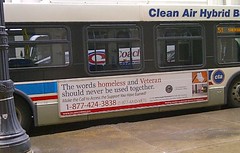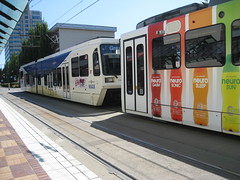-- Projected population growth between 2000 and 2030 is significant in the southcentral Pennsylvania region.To encourage transit use, county borders must become seamless, the study recommends. A potential market is young adults.
-- The need for more express services, multimodal linkages and park and rides was identified.
-- A common way to pay for fares on different transit systems is essential.
-- Transit is viewed as a choice for the younger generation.
-- Separate funding for inter-county transit service coordination is needed in legislation with local political support.
-- Partnerships with local government and employers are very important for regional transit coordination.
Amenities like wireless Internet on buses, such as Rabbit Transit express buses that run between York and Harrisburg and to Maryland, appeal to younger riders.Source: Study finds need for transit coordination in York region, from the YorkDispatch.com
"It seems the younger generation is more open to mass transit and living a sustainable lifestyle," Heilman said.
[Bus outside Chicago's Union Station.]
Texas Partnerships Moving Forward
A disability navigator in Corpus Christi, Tex., a member of the new LinkedIn group for the Partnership for Mobility Management, sent information about his region's experience with the Accessible Transportation Coalitions Initiative, a project of Easter Seals Project ACTION. The ATCI team became the Stakeholder Advisory Committee for the Mobility Options Project, a
Coastal Bend Center for Independent Living demonstration project, funded by a JARC grant from Texas Department of Transportation that:
partners with Workforce Solutions of the Coastal Bend and the Department of Assistive and Rehabilitation Services to increase mobility options for people with disabilities seeking employment-related opportunities. The two-year Mobility Options Project advances the plan developed at the ATCI event primarily regarding increasing access for people with disabilities in rural area, and expanding hours and days of service. To further promote new initiatives in their community that promote the team’s priorities, the ACCESS TEAM advocated for the Corpus Christi Regional Transportation Authority’s successful application for funding through the Department of Transportation’s Veterans Transportation and Community Living Initiative. This initiative will support the development of a regional call center that will provide a single point of access for regional transportation.The team hosted a mobility management summit in the fall and discussed creation of a "united mobility management system" by examining "the positive and negative aspects of three models of mobility management: human services/independent living-based, workforce development-based, and public transit system-based."
[Portland light rail train near convention center. Hardly any wait and just a few free minutes to downtown near the federal courthouse (free tour available), department stores and the cute animal fountains.]
Social Media Meets Depressing Transit Choices
In a story of partnering with the public to decide how to make up for revenue shortfalls and inevitable service reductions or fare increases, the Oregonian reports that Portland's TriMet transit agency is asking residents to offer their opinions about how to plug a budget hole of $17 million. The article is entitled Want to tell TriMet how to run a railroad (and buses)? Now's your chance, about a social media campaign survey that is more like a game.
The site is part poll and part make-painful-choices game. "Love Connection" it's not. Think "Wheel of Fortune" meets a version of the "Sims" video game that allows players to manage a transit agency. There's a red bar reading "$17 million." You control a green bar, which moves depending on whatever service cuts and fare changes you click on. The goal is to balance the green and red.
... ... ... ...
(Yes, TriMet riders and payroll tax payers, it may be the most depressing interactive survey you've ever taken.)
"We're hoping to get an idea of what the public sees as the best approach," said TriMet General Manager Neil McFarlane. "We also want to help people understand the tough tradeoffs that the agency faces."
The "game" is available at trimet.org/mailforms/budgetchoices.
Can I Borrow Your Car?
One more Portland story that I think is relevant for rural and suburban areas as well, though probably needs a few kinks worked out, is carsharing that is similar to, but goes beyond asking to borrow a neighbor's car. The Oregonian reports that federal funding, changes to the state's automobile insurance law and a venture by a private company will allow cheap pay-by-the-hour car rentals. Basically, you might be able to borrow - for a fee - the old hatchback down the street that has junk all over the front passenger seat or maybe the neat Audi convertible you admire.
With $1.7 million in federal grant money, California start-up Getaround will debut its personal car-sharing service in February, assuming a test period at the Portland State University campus goes well. The pilot starts on Jan. 1.
My source for the Portland stories is my-ever-reliable source, the TransitWire.






No comments:
Post a Comment